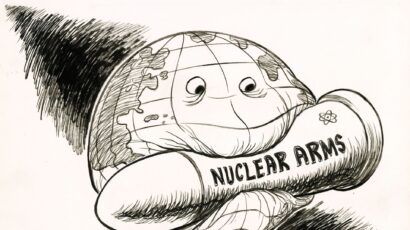Oh, Canada!
By Dawn Stover | January 8, 2014
My favorite gift of 2013 arrived in the mail a few days before Christmas: two cans of pure maple syrup made in Quebec by longtime friends, the Stevenson family. Printed on the metal cans is an image that instantly transports me back to my childhood in Canada: In a woodland scene, several men in plaid jackets pour sap from tapped sugar maple trees into buckets, and from there into a horse-drawn tank. Firewood is stacked alongside a red shanty, and steam rises from its roof. I can almost smell the sap boiling, and the scene conjures memories of Floyd Stevenson trickling hot syrup across a pan of fresh snow, and offering me a fork to taste the strands of sweet, frozen taffy.
In the eyes of a first-grader, Canada was a land of vast forests, deep snow, and crisp Macintosh apples. I knew that the nation that put a maple leaf on its flag wasn’t simply one big national park, but for many years afterward, Canada seemed to be a great green land where large carnivores still roamed, and key environmental protections remained intact.
In recent years, however, Canada’s conservative leaders—who are not so when it comes to conserving natural resources—have systematically trashed those protections. My Canadian friends tell me that many of their countrymen don’t even discuss climate change; it is considered unpatriotic to do so, now that Canada has hitched its economic sled to oil.
Oh, Canada. What happened to you, eh? Where is the “land glorious and free” described in your national anthem? Who is now standing “on guard for thee?” You have lost your true north.
Priming the pump. The natural resources that Canada is increasingly tapping today are fossil fuels. Canada’s crude oil production has increased by about a third during the past decade, mostly because of tar sands development in Alberta. If the Obama administration approves the Keystone XL pipeline proposed by the energy company TransCanada, the conduit will extend from Alberta to the US Gulf Coast and open new markets for Canadian oil exports.
While environmental activists in the United States have focused on Keystone, though, another Canadian project has flown under the radar. A federal review panel recently approved plans for the Enbridge Northern Gateway Project, a new pipeline and port that would facilitate oil exports from Canada’s Pacific Coast to Asia. According to a report in InsideClimate News, “The goal is to double or triple tar sands output in the decades ahead, clearing the transportation bottlenecks that have depressed prices for tar sands crude, and getting Canada's vast reserves onto more lucrative markets outside North America.” But while the government review panel assessed the climate impacts of building and operating the pipeline, it did not study the effects of the increased production that would result, saying that the latter was “beyond the scope of its review.”
Largely because of oil production, Canada is now expected to miss its target of reducing greenhouse gas emissions by 17 percent (below 2005 levels) by 2020, which it committed to under the 2009 Copenhagen Accord. A government report released in October showed that emissions decreased between 2005 and 2011 but have since risen, and that by the end of the decade they will be 20 percent higher than the target. Annual emissions attributed to the tar sands are forecast to grow from 34 million metric tons in 2005 to 101 million metric tons in 2020. Canada’s per-capita emissions are now only slightly less than in the United States and Saudi Arabia.
Government complicity. Although the Canadian federal government led by Prime Minister Stephen Harper claims to be committed to fighting climate change, its actions suggest otherwise. Ottawa has spent heavily on a pro-tar-sands advertising campaign and on lobbying in Washington for approval of the Keystone pipeline. Meanwhile, Wikileaks documents reveal that at least 13 agencies within the Harper government have had contracts with the US private intelligence firm Strategic Forecasting, Inc. (Stratfor), which counseled them on how to handle environmental groups such as Greenpeace.
The Canadian government is also distributing largesse directly to extraction companies. According to a recent analysis by PostMedia News, more than $400 million in federal subsidies for biofuels, wind projects, and carbon-capturing technology have gone to profitable oil and gas corporations including Enbridge, Shell Canada, Suncor, and Husky. Some of these same energy companies are doing a poor job of reporting their environmental performance, compared with their global peers.
Government repression. Since Harper’s election in 2006, his Conservative Party government has withdrawn from the Kyoto Protocol, gutted environmental legislation, forced the closure of an Arctic research station that monitored climate change, and, most recently, cut $100 million from the budget of the department in charge of protecting Canada's water and oceans. An online survey of Canadian government scientists found that 90 percent feel they can’t speak freely to the media.
Make no mistake: The United States has dragged its feet on climate too, and US media have criticized the Obama administration for its restrictions on access to government officials and scientists employed by public institutions. But that’s no justification for the Harper government’s relentless assault on science, which it pursues despite the fact that the majority of the Canadian public favors action on climate change, and even Shell Canada has called for more regulation.
A few Canadian cities and provinces are taking the lead on climate. British Columbia, for example, has run a successful carbon tax program for more than five years now, and a key part of Quebec’s climate change action plan for the years 2013 to 2020 is to establish a carbon cap-and-trade system. The federal government, however, remains firmly in the grip of the oil and gas industry, as in the United States, despite the fact that Canada’s energy industry accounts for less than 7 percent of GDP and employs fewer than 300,000 people. Far more important is the vast Canadian service sector, which accounts for about 70 percent of GDP and three-quarters of the labor force.
Shortchanging renewables. The Canadian federal government’s support for fossil fuels comes at the expense of other key industries, natural resources, and cultures. Climate change is wreaking havoc on ski resorts, forests that supply wood and paper products, and Canada’s many First Nations families who rely on fishing and hunting—and live in communities threatened by sea level rise and oil spills. Even the abundant oil from Alberta’s tar sands is of little benefit to consumers in eastern Canada, where two-thirds of Canadians live. Although Canada is one of the few developed nations that are net exporters of energy products, it is cheaper for Alberta to export oil to the United States than to send it to eastern Canada.
Alberta’s gain may be Quebec’s pain. Although Quebec has the lowest per-capita carbon dioxide emissions of any province in Canada—less than one-sixth those of Alberta—it will be hard hit by climate change. By 2050, winter temperatures are predicted to be 3.8 degrees Celsius higher in southern Quebec than in 1960, and a whopping 6.5 degrees Celsius higher in the north.
As the planet warms, renewable resources like maple syrup will be disrupted. The optimal temperature zone within which sugar maple trees can thrive has been shifting north. Maple trees would have to move about 90 feet a day to keep up, said Alain Bourque, director of climate change impacts and adaptation at Quebec’s research institute Ouranos, in a 2011 interview with The Montreal Gazette.
For a while, Canada’s northernmost syrup makers may benefit from a longer sap-flow season. But within my lifetime, the sugar maple forests of my youth will become climate refugees unable to flee. That makes the gift that I received this Christmas even more precious.
Together, we make the world safer.
The Bulletin elevates expert voices above the noise. But as an independent nonprofit organization, our operations depend on the support of readers like you. Help us continue to deliver quality journalism that holds leaders accountable. Your support of our work at any level is important. In return, we promise our coverage will be understandable, influential, vigilant, solution-oriented, and fair-minded. Together we can make a difference.
Topics: Climate Change, Columnists















